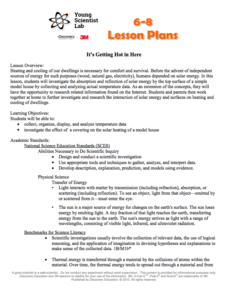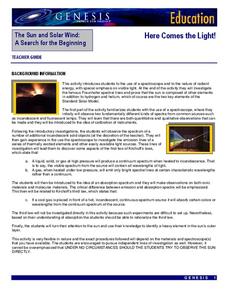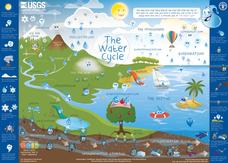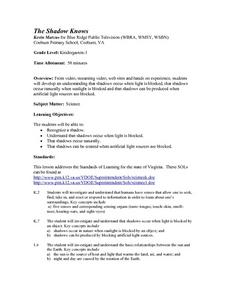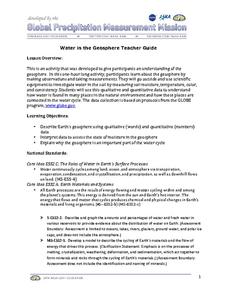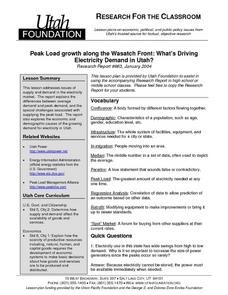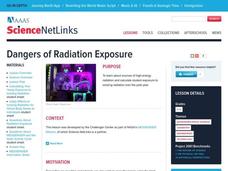Discovery Education
It's Getting Hot in Here
Class members engage in a STEM experiment and investigate how materials affect heating in a house by creating models of houses and using different top surface materials. They record the temperature inside the models and consider what the...
Cornell University
Catapults
Ready, aim, fire! Launch to a new level of understanding as scholars build and test their own catapults. Learners explore lever design and how adjusting the fulcrum changes the outcome.
NASA
Here Comes the Light!
Look beyond the light! An engaging activity introduces young scholars to the application of a spectroscope. The lesson is the fifth in a series of six and focuses on the analysis of the elements of the sun.
Columbus City Schools
What’s Up with Matter?
Take a "conservative" approach to planning your next unit on mass and matter! What better way to answer "But where did the gas go?" than with a lab designed to promote good report writing, research skills, and detailed observation....
Science Geek
Kinetic Molecular Theory
The fourth presentation in a series of five begins with information about the nature of gases and what to expect from them. Then it discusses kinetic molecular theory, diffusion, and Graham's Law, and concludes with the purification of...
University of Texas
Lives of Stars
Stars exist from a few million years to over 10 billion years, depending on their mass. Scholars perform a play acting as stars to learn about their different life cycles. They develop an understanding of many of the fundamental concepts...
Teach Engineering
May the Force Be With You: Drag
Do not let friction drag you down! The 11th segment in a series of 22 focuses on the fourth force acting upon an airplane—drag. Pupils learn about the effects and causes of drag.
S2tem Centers SC
Seasons
Winter, spring, summer, and fall—take the learning of the seasons beyond the elementary level to the middle school classroom. Curious learners begin by watching videos about the seasons and the rotation of planet Earth. Then,...
Texas Commission on Environmental Quality
Environmental Sciences
Whether you are teaching environmental science in junior high or studying recycling in kindergarten, there is something for all in this set of lessons designed for environmental education. The 110-page packet comes with tips for...
US Geological Survey
Water Cycle Poster
How many parts make up the water cycle? How many things on Earth rely on water as a system? Learn more about the water cycle in an informative and colorful poster. Print and hang, or project the graphic in the classroom for optimal use.
Channel Islands Film
Human Impact on the Food Web of Santa Cruz Island
What happens when a non-native species is introduced onto an island? Santa Cruz Island, part of the Channel Island chain located off the coast of southern California, provides the perfect laboratory for young environmental scientists to...
Curated OER
The Shadow Knows - Creating Shadows
Young learners recognize a shadow and witness how shadows occur when light is blocked. They access streamed video, standard video, and websites in order to engage in their study of how light is naturally blocked to create shadows. An...
Curated OER
Photo Synthesis and Transpiration
Students germinate pea seeds and plant the seeds. They experiment with different amounts of light and darkness on the plant growth.
Curated OER
Water in the Geosphere
Through a PowerPoint presentation and the embedded animation and video, earth science enthusiasts find out about the moisture in the soil beneath our feet. In the animation, follow a water molecule on its path through the water cycle. As...
Curated OER
How Green Are We?
Students identify and interpret the importance of energy efficiency in connection with air pollution. They communicate with families and peers about ways to more effectively contribute to the reduction of air pollution. Finally,...
Curated OER
The Math of Light
Investigate light intensity, illuminance, and power consumption of different light source.Compare the efficiency of light bulbs then create a persuasive advertisement about it.
Curated OER
Peak Load Growth Along the Wasatch Front: What's Driving Electricity Demand in Utah?
Students study how electricity is used in Utah. They create an advertising plan to educate consumers about peak cycles and energy costs for the cycling service of electricity. They present their advertising plan to the class for...
Curated OER
Composition of Fuels -- Chemical Models Investigation
Students construct models of alternative fuel molecules and record their molecular formulas. They participate in a lab activity in which they demonstrate the chemical reactions that take place. They balance chemical equations.
Curated OER
Tour de Texas
Eighth graders plan a trip to Texas and calculate the amount of alternative fuel they would need. They gather information on vouchers, gas stations and a budget. They predict how far they can travel and what they will visit. They compare...
Curated OER
Cool It! Comprehension - Chart 2
In these reading comprehension worksheets, learners read chart 2 about how people contribute to climate change and then complete a quiz, list energy sources and modes of transport. Students answer several comprehension questions about...
Curated OER
Luminous Efficacy (Efficiency)
Students examine the basics of luminous efficacy and why it is used. In this light source lesson students test energy efficiency and the luminous efficiency for babies.
Curated OER
Carbohydrates-Simple and Complex
Grain products are staple foods and sources of simple and complex carbohydrates that provide energy for the body. Define simple and complex carbohydrates Identify function and sources of simple and complex carbohydrates Describe how...
Curated OER
Evaporation Introductory Lesson
Fourth graders examine the concepts of evaporation and the water cycle. They describe the relationship between heat energy, evaporation and condensation of water on Earth and identify the sun as the source of energy that evaporates...
Curated OER
Dangers of Radiation Exposure
High schoolers calculate their yearly exposure rate to harmful high-energy radiation and cumulative effects over time. They use the information to evaluate the various sources of radiation that are of greatest concern for them.
Other popular searches
- Alternative Energy Resources
- Energy and Mineral Resources
- Earth's Resources for Energy
- Energy From Natural Resources
- Energy and Resources


